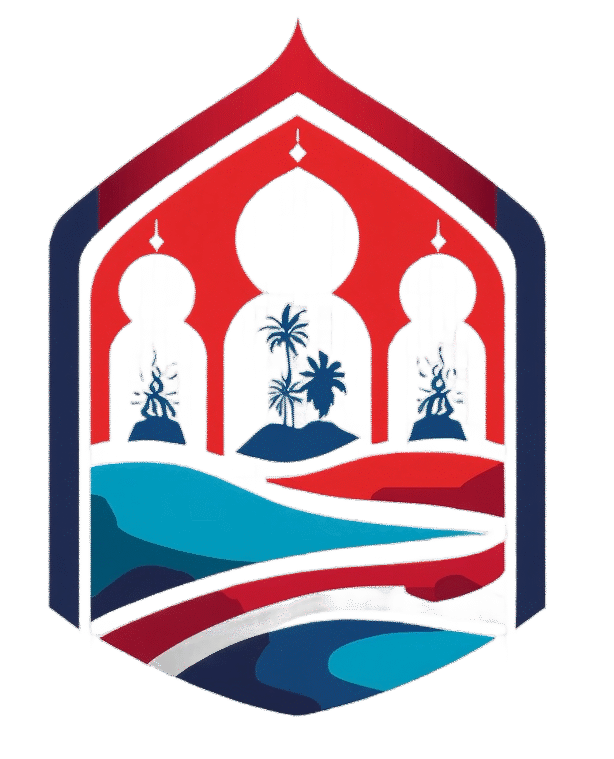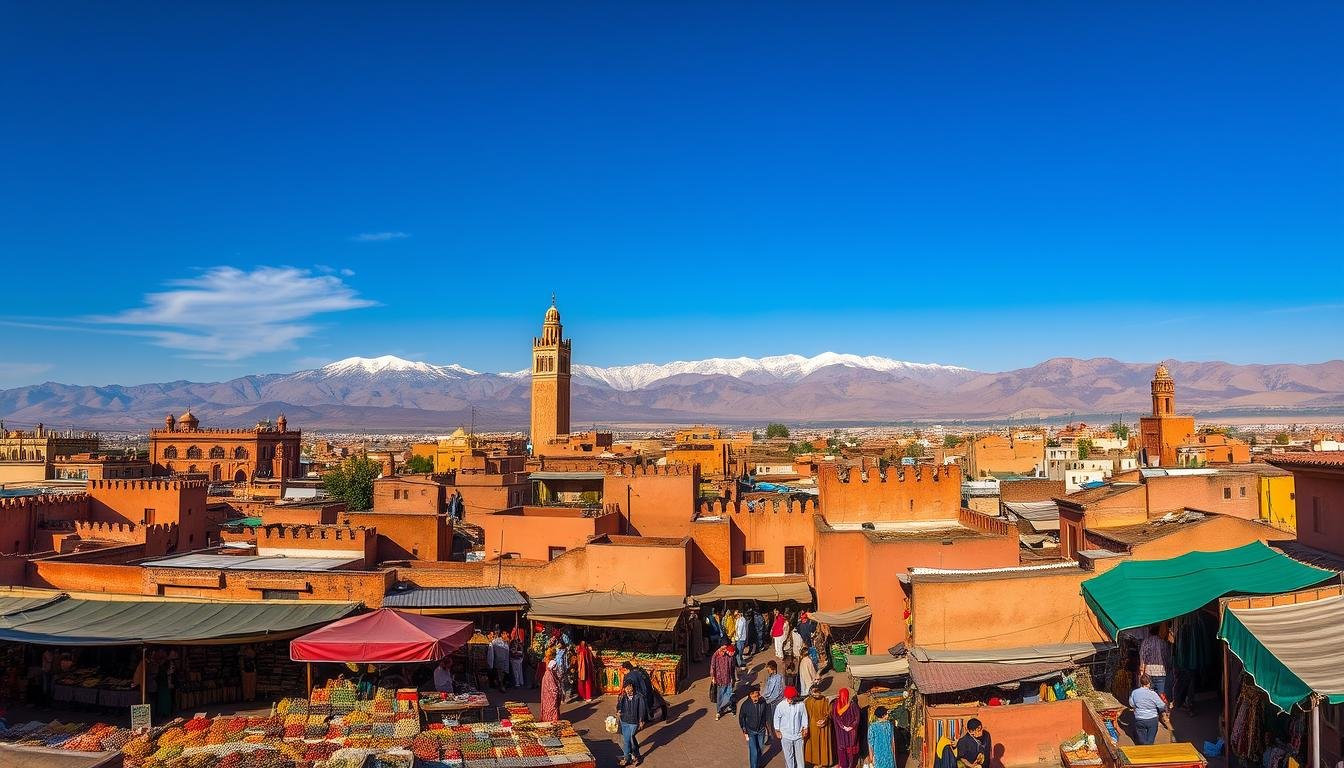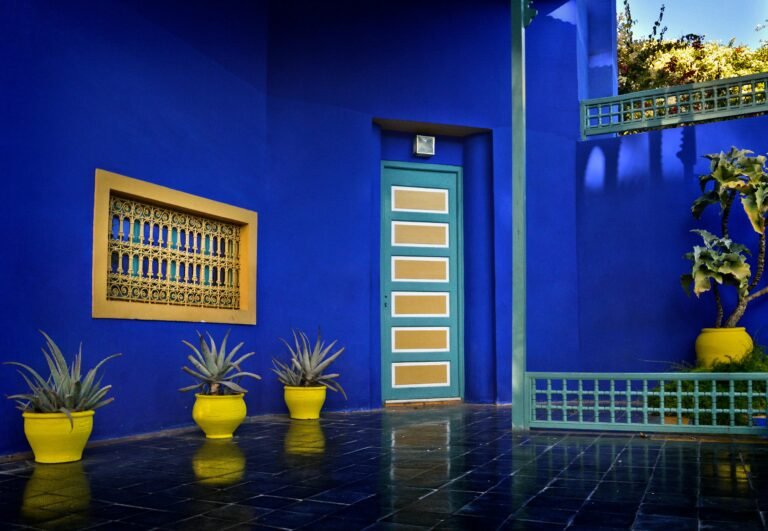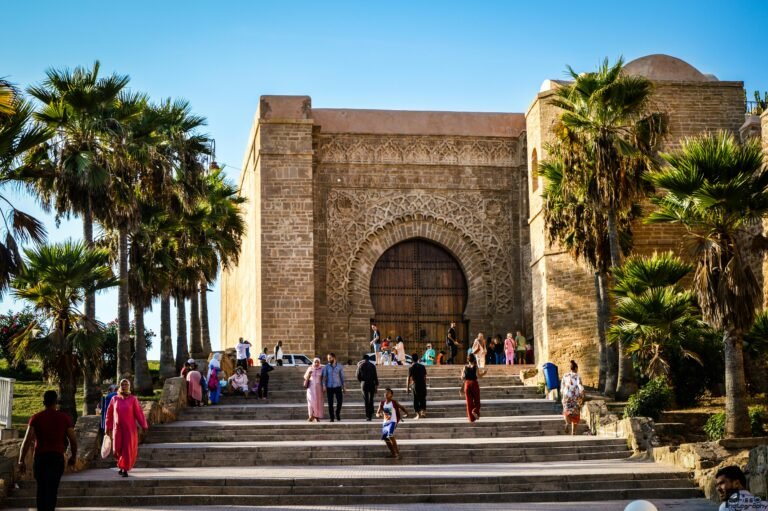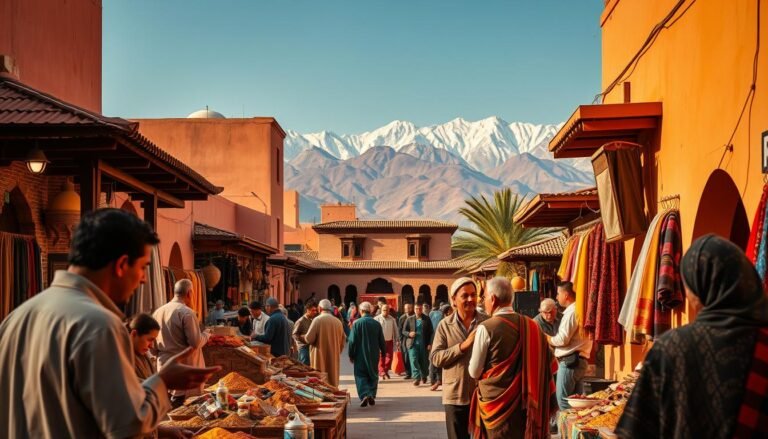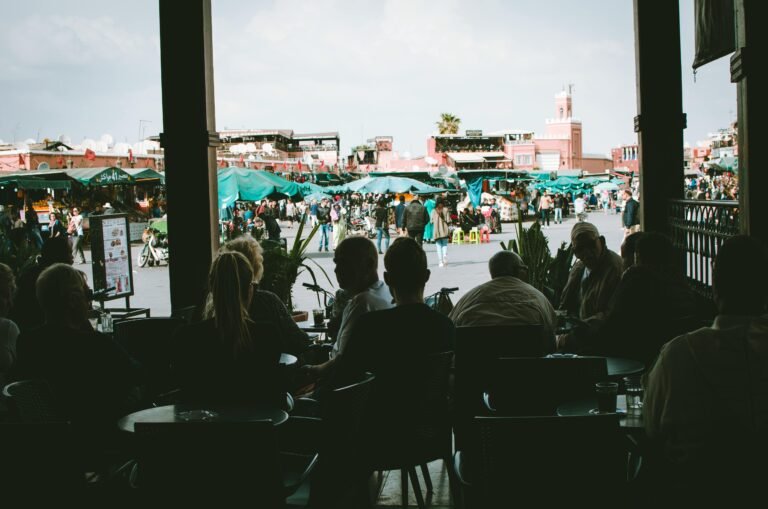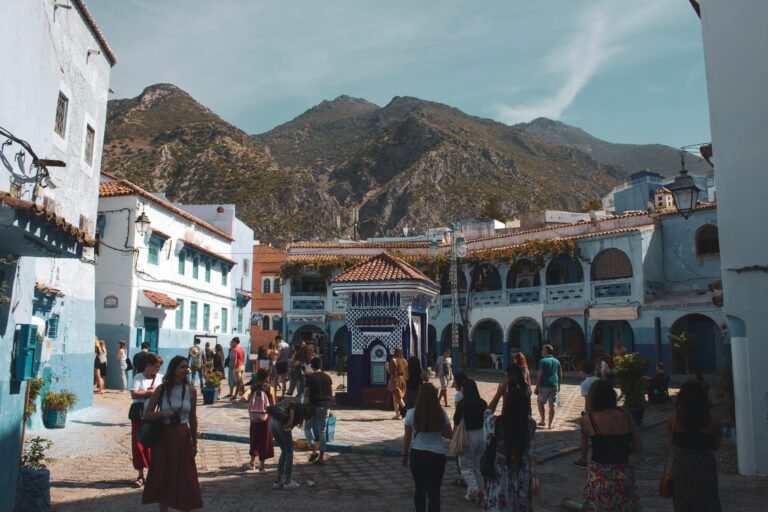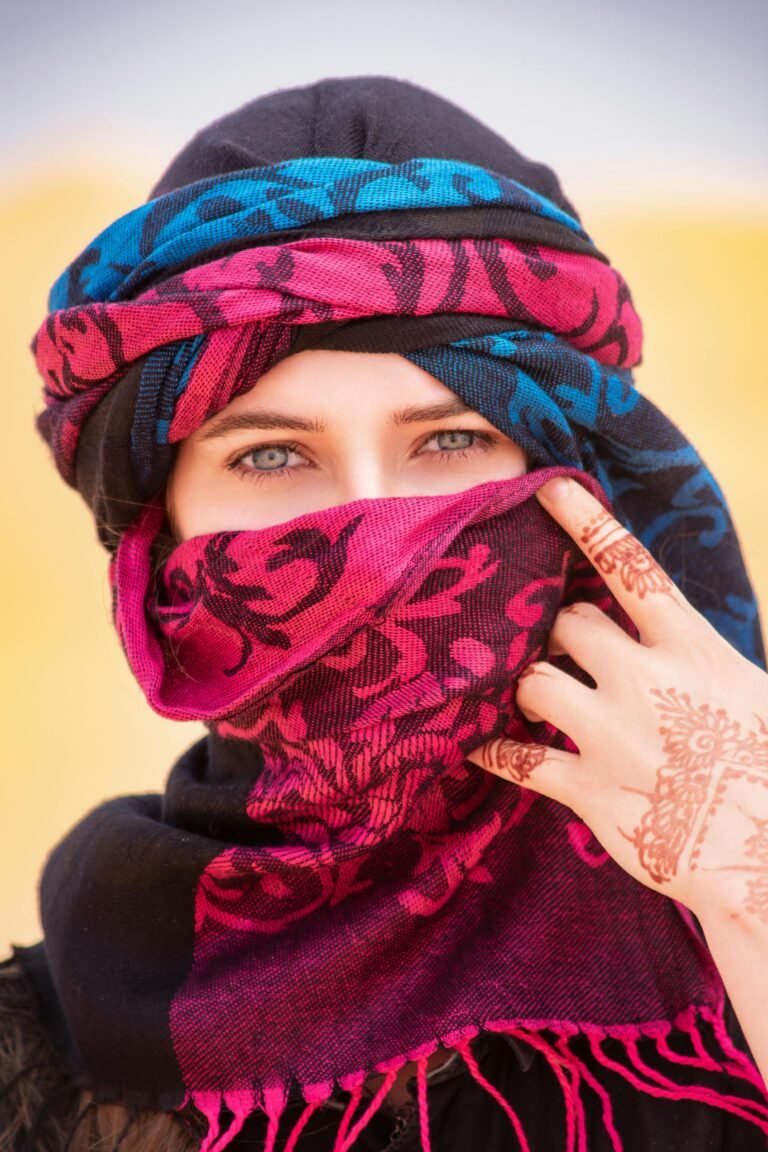Best Time to Visit Morocco
Best Time to Visit Morocco ,Did you know Morocco is a year-round destination? It offers a wide range of experiences for all travelers. You can explore vibrant cities, serene beaches, majestic mountains, and haunting desert dunes. Morocco’s varied landscapes make every visit special.
https://en.wikipedia.org/wiki/Geography_of_Morocco
When planning your Morocco vacation, think about the best season to see these attractions. The country’s climate changes a lot from one place to another. So, the timing of your visit is key to enjoying what you want to see and do.
Key Takeaways
- Morocco offers diverse experiences throughout the year.
- The country’s climate varies by region.
- Choosing the right time to visit is important for your activities.
- From cities to desert dunes, Morocco has a lot to offer.
- Understanding the seasonal weather trends can improve your trip.
Morocco’s Climate Overview
Morocco’s diverse geography makes it a fascinating place to explore. The country has everything from rugged mountains to vast deserts. This variety leads to different climates across its landscapes.
Geographic Diversity and Its Impact on Weather
Morocco is home to mountains, deserts, and coastlines along the Atlantic and Mediterranean. This mix of geography leads to different weather patterns in each area. For example, the Atlas Mountains get cold winters with snow, while the Sahara Desert is very hot during the day but cooler at night.
General Climate Patterns Throughout the Year
In the north, Morocco has a Mediterranean climate. This means mild, wet winters and hot, dry summers. The south, with the Sahara Desert, gets very little rain all year. Coastal areas are generally milder than inland ones.
Knowing these climate patterns helps you plan your trip better. It ensures you’re prepared for the activities you have in mind.
| Region | Winter | Summer |
|---|---|---|
| Atlas Mountains | Cold, snowy | Mild |
| Sahara Desert | Cool nights, warm days | Extremely hot |
| Coastal Areas | Mild, wet | Warm, dry |
Spring in Morocco (March-May)
The spring season in Morocco, from March to May, is perfect for exploring its landscapes and heritage. As winter fades, the country becomes a lively place. It offers nice weather and many cultural experiences.
Weather Conditions and Temperatures
Spring in Morocco brings mild temperatures, from 15°C to 25°C (59°F to 77°F). This is ideal for seeing sights and enjoying the outdoors. The weather is mostly sunny, with little rain, mainly in the south.
Popular Spring Destinations
Marrakech is a top spot in spring, thanks to its mild weather. You can easily explore its lively streets and markets. The Atlas Mountains are also a hit, with their stunning views and hiking trails.
Spring Festivals and Events
Spring in Morocco is filled with festivals, cultural events, and music. These celebrations highlight the country’s rich heritage. They offer a special experience for visitors.
| Month | Average Temperature | Notable Events |
|---|---|---|
| March | 18°C (64°F) | Marrakech Popular Arts Festival |
| April | 20°C (68°F) | Rabat International Film Festival |
| May | 23°C (73°F) | Fes World Sacred Music Festival |
Spring is a fantastic time to visit Morocco. The weather is pleasant, and there are many cultural events. Whether you love history, the outdoors, or local culture, Morocco has something for everyone in the spring.
Summer in Morocco (June-August)
Morocco in summer is full of contrasts. The inland gets very hot, while the coast stays cool. Knowing the differences is key to enjoying your trip during the peak season in Morocco.
Heat Considerations and Regional Variations
Inland areas like Marrakech and Fes can get over 38°C (100°F). But, the Atlantic coast is a different story. Places like Essaouira and Casablanca stay around 27°C (80°F) thanks to the sea breeze.
Coastal Escapes and Mountain Retreats
Summer is perfect for exploring Morocco’s varied landscapes. The coast and the Atlas Mountains offer cool climates and fun activities. The mountains are great for hiking, while the coast is perfect for beach activities.
Summer Cultural Experiences
Summer in Morocco is also a time for cultural events. The summer festivals showcase traditional music, dance, and food. These festivals are a great way to dive into Moroccan culture and meet locals.
Best Time to Visit Morocco ,With these Morocco travel tips, your summer trip will be unforgettable. Morocco offers cultural experiences, outdoor fun, and relaxing spots, making it a great summer destination.
Autumn in Morocco (September-November)
Autumn in Morocco is perfect for exploring the country’s cities and landscapes. The weather cools down, making travel more enjoyable.
Weather Patterns and Temperature Changes
In autumn, Morocco’s temperatures drop, mainly in the mornings and evenings. September is great for visiting, with warm weather and long sunny days. The season gets cooler, making sightseeing and outdoor activities more comfortable.
Ideal Autumn Destinations
Autumn is a great time to visit Morocco’s top spots. Some highlights include:
- The coastal cities, like Essaouira and Rabat, with their pleasant weather and cultural experiences.
- The Atlas Mountains, perfect for hiking and enjoying stunning views.
- The desert regions, ideal for Sahara trips and camel treks.
Harvest Festivals and Cultural Events
Autumn in Morocco is filled with harvest festivals and cultural events. You can dive into the country’s heritage at festivals like the Marrakech International Film Festival. Enjoy traditional music and dance too.
Overall, autumn is an ideal time to travel to Morocco. It offers pleasant weather, cultural experiences, and exciting events.
Winter in Morocco (December-February)
Winter in Morocco brings a refreshing change. Cities have mild temperatures, and the mountains are serene. It’s important to know the weather and what Morocco offers during this season.
Temperature Ranges and Rainfall
January is the coolest and wettest month. Daytime highs are between 10-20°C. The mountains are chillier, but the desert is warmer. Knowing these temperatures helps you pack right and enjoy your Morocco travel tips.
Winter Activities and Experiences
Morocco’s landscapes offer many winter activities. You can ski in the Atlas Mountains, explore cities, or relax in desert oases. Winter is great for experiencing Morocco’s culture without crowds, perfect for morocco tourism season.
“The winter season in Morocco is a time of tranquility and beauty, with the Atlas Mountains being some of the best skiing in North Africa.”
Holiday Celebrations and Winter Festivals
Winter in Morocco is festive, with New Year and local events. You can dive into local culture by joining these festivals. They give a unique look into Moroccan traditions and hospitality.
Planning your winter trip to Morocco? Consider the mild climate, activities, and cultural experiences. With these morocco travel tips, you’ll be ready to enjoy Morocco’s winter season.
The Best Time to Visit Morocco Based on Regions
Morocco’s climate varies by region, affecting the best time to visit. The country’s geography, from coast to desert, creates different climates. Knowing these variations helps plan your trip.
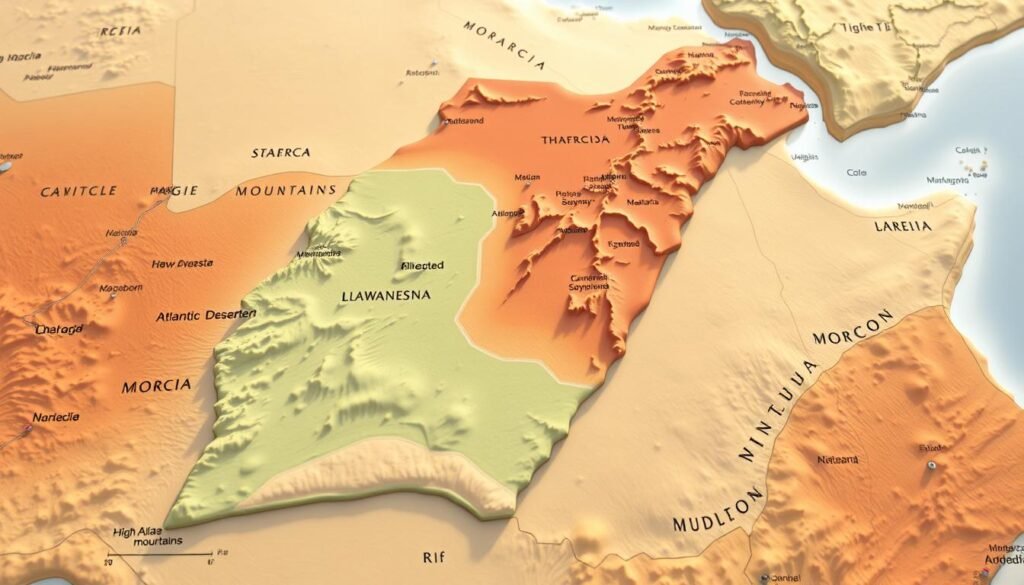
Marrakech and Central Morocco
Marrakech and central Morocco have a warm, arid climate. Spring (March to May) or autumn (September to November) are the best times to visit. These periods offer mild temperatures. Summer is very hot, and winters are mild but can get chilly at night.
Coastal Cities: Casablanca, Rabat, and Essaouira
The coastal cities have a Mediterranean climate. They have mild winters and warm summers. Summer (June to August) is perfect for beach activities. Spring and autumn offer pleasant weather without the crowds.
The Atlas Mountains and Desert Regions
The Atlas Mountains are cooler than the rest of Morocco. They’re a great escape in summer. Spring and autumn are the best times to visit.
For desert regions like Merzouga and Zagora, autumn and spring are best. These seasons have more comfortable temperatures for desert trips.
Northern Morocco: Fes, Meknes, and Chefchaouen
Northern Morocco has a Mediterranean climate with more rain. Spring and autumn are the best times to visit Fes, Meknes, and Chefchaouen. These seasons offer mild weather for exploring historical sites and enjoying nature.
In conclusion, Morocco’s diverse regions have different climates. Planning your visit based on the region ensures a more enjoyable trip.
Best Time to Visit Morocco for Different Activities
The best time to visit Morocco depends on what you want to do. You might want to see cultural sights, go on outdoor adventures, or relax on the beach. Morocco’s climate and geography change with the seasons, making it great to visit all year.
For Cultural Experiences and Festivals
Morocco is full of cultural events all year. The best times are spring (March to May) and autumn (September to November). The weather is nice, and festivals like the Mawazine Festival in Rabat and the Marrakech Popular Arts Festival happen then.
For Outdoor Adventures and Hiking
The High Atlas Mountains are perfect for outdoor fun all year. But, the best months for hiking are April to June and September to November. The weather is just right, avoiding cold winters and hot summers.
For Beach Holidays and Coastal Experiences
The coast of Morocco, like Essaouira and Agadir, is great for beach trips. Summer (June to August) is the best time. The weather is warm and sunny, perfect for swimming and water sports.
For Desert Excursions and Sahara Trips
Desert trips are best from October to April. The cooler weather makes it easier to explore the desert. You can enjoy camel rides or 4×4 adventures.
| Activity | Best Time | Reason |
|---|---|---|
| Cultural Experiences | Spring (Mar-May) & Autumn (Sep-Nov) | Pleasant weather and festivals |
| Outdoor Adventures | Apr-Jun & Sep-Nov | Mild weather for trekking |
| Beach Holidays | Summer (Jun-Aug) | Warm and sunny weather |
| Desert Excursions | Oct-Apr | Cooler temperatures for desert travel |
Knowing when to visit Morocco for different activities makes your trip better. Whether you love culture, adventure, or beach time, Morocco has it all year.
Traveling During Ramadan and Other Religious Periods
Best Time to Visit Morocco during Ramadan and other religious holidays needs some special planning. Morocco is rich in culture and religion. Knowing the local customs can make your trip better.
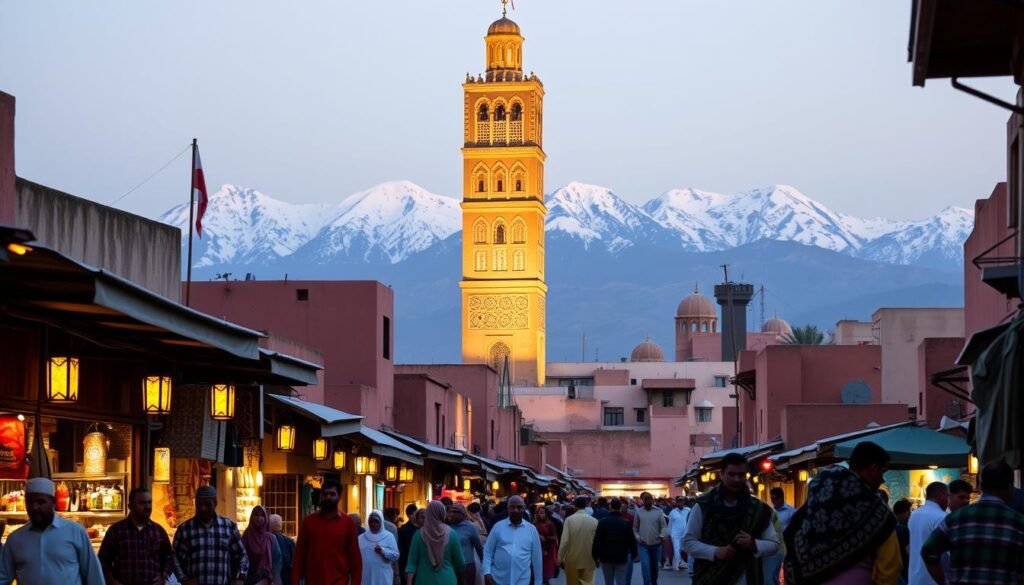
What to Expect During Ramadan
During Ramadan, many places are closed during the day. But, it’s a great time to see the local culture and spirituality. In the evenings, families and friends gather to break their fast, making it festive.
You can enjoy Moroccan food in the evenings. Many places offer special iftar menus to break the fast.
Other Religious Holidays and Their Impact
Other big holidays in Morocco are Eid al-Fitr and Eid al-Adha. These holidays can change how tourist services work, with some places closed or open later.
Knowing about these holidays helps you plan better. It also shows respect for local customs.
Tips for Respectful Travel During Religious Periods
To travel respectfully during these times, follow these tips:
- Be mindful of fasting customs and avoid eating in public during Ramadan.
- Dress modestly and respectfully, even at religious sites.
- Be ready for changes in business hours and plan your day.
| Religious Period | What to Expect | Tips for Travelers |
|---|---|---|
| Ramadan | Fasting during the day, festive evenings | Avoid public eating, dress modestly |
| Eid al-Fitr | Celebration marking the end of Ramadan | Be prepared for crowded areas and festivities |
| Eid al-Adha | Festival of sacrifice, may affect business hours | Plan for possible closures and reduced services |
Respecting these religious periods makes your trip more rewarding. Planning around these times lets you dive deeper into the local culture.
UK to Morocco: Practical Travel Considerations
Traveling from the UK to Morocco requires some planning. Whether you’re heading to Marrakech’s markets or Essaouira’s beaches, being ready is essential. It makes your trip smooth and fun.
Flight Options Throughout the Year
Many airlines offer direct flights from the UK to Morocco. You can choose from British Airways, EasyJet, and Royal Air Maroc. Flight times and options change with the seasons, with more during busy times.
- Direct flights available from major UK airports
- Flexibility in choosing departure and arrival times
- Book in advance to secure the best deals
Time Differences and Seasonal Changes
Morocco is on GMT+1 in standard time and GMT+0 in daylight saving. These changes affect your travel plans. Make sure to check them when booking flights or arranging travel within Morocco.
Visa Requirements and Entry Regulations
UK citizens don’t need a visa for up to 90 days of tourism or business. Your passport must be valid for at least six months after you leave Morocco. Always check the latest entry rules before you go.
Key Documents:
- Valid passport
- Return or onward ticket
- Proof of sufficient funds
Health and Safety Considerations by Season
Morocco’s weather changes a lot with the seasons. Summers are hot, and winters can be cool. Drink plenty of water, wear sunscreen, and follow health advice for your destinations.
By thinking about these details, you can plan a great trip to Morocco. Whether you’re shopping in souks or enjoying the coast, Morocco has something for everyone.
Your Morocco Journey: Making the Most of Any Season
Morocco is a great place to visit all year round. Its climate and culture are rich and varied. You can enjoy spring festivals, warm summers, mild autumns, or cool winters here.
The best time to visit Morocco depends on what you like to do. Marrakech’s busy streets, the Atlas Mountains’ calm, and the Sahara Desert’s vastness are all waiting for you. Each season brings a new experience.
Knowing when to visit Morocco can enhance your trip. You can catch cultural events, go on outdoor adventures, or relax by the coast. Choose the right time for your travel plans.
So, pack your bags and get ready to explore Morocco’s beauty and charm. It doesn’t matter when you go, you’ll find something special.
